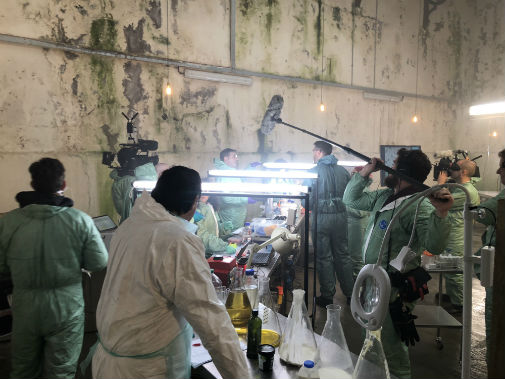Expert Comment: Fatberg Autopsy
Posted on 30 April 2018

The filming of Fatberg Autopsy. Credit: Dr John Wilkinson
“We came up with a method to analyse the components of the fatberg using ultrasonic solvent extraction and then mass spectrometry. Specifically, we looked at the quantities of 40 different pharmaceuticals, three plasticisers, four perfluorinated surfactants as well as benzoylecgonine (the main urinary metabolite of cocaine).
Contaminants
“Surprisingly, there were relatively low concentrations of these chemicals in the fatberg itself; however we did find high concentrations of pharmaceuticals and many of the other contaminants in the sewage flowing around the fatberg.
“Most interesting to me was the high concentration of the antibiotic ciprofloxacin in the London sewage water sample. We’ve done quite a bit of work here in York and nearby areas looking at this pharmaceutical and found concentrations generally about 10 times lower in untreated sewage. I suspect that the part of the sewer where the London samples came from was receiving waste water from a hospital.
Environment
“It’s unlikely that residues of these pharmaceuticals in sewage, or indeed in fatbergs, directly affect human health. The chemicals in these samples would have made their way to a sewage treatment plant in London where they will have been predominately degraded then discharged into the Thames. The way in which such contaminants may affect organisms in the aquatic environment though is a question that’s still being studied.”
Explore more news

Nightjars at real risk from decreasing genetic diversity, researchers warn
Tuesday 22 July 2025

A ‘millet mystery’ in ancient Japan reveals a complex picture of agricultural adoption, research shows
Monday 21 July 2025

Wednesday's child is not "full of woe," new study finds, debunking popular nursery rhyme
Wednesday 16 July 2025

Optical telescope on York rooftop to advance communication between space and earth
Wednesday 16 July 2025

Study helps urban farmers create ‘light recipe’ to increase crop yield
Thursday 10 July 2025
Media enquiries
About this research
Dr John Wilkinson is from the Environment Department. Explore our research.
